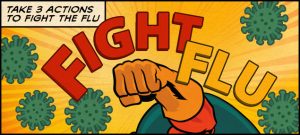Get yourself and your family vaccinated!
A yearly flu vaccine is the first and most important step in protecting against flu viruses. Everyone 6 months or older should get an annual flu vaccine by the end of October, if possible, or as soon as possible after October.
Flu vaccines are offered in many locations, including doctor’s offices, clinics, health departments, pharmacies and college health centers, as well as by many employers, and even in some schools. Protect Yourself. Protect Your Family. Get Vaccinated. #FightFlu
Take everyday preventive actions to help stop the spread of flu viruses!
Avoid close contact with sick people, avoid touching your eyes, nose, and mouth, cover your coughs and sneezes, wash your hands often (with soap and water), and clean and disinfect surfaces and objects that may be contaminated with flu viruses.
If you become sick, limit contact with others as much as possible. Remember to cover your nose and mouth with a tissue when you cough or sneeze, and throw tissues in the trash after you use them. Stay home for at least 24 hours after your fever is gone except to get medical care or for other necessities. (Your fever should be gone for 24 hours without the use of a fever-reducing medicine before resuming normal activities.)
Take Antiviral Drugs if Your Doctor Prescribes Them!
If you get the flu, antiviral drugs can be used to treat flu illness.
Antiviral drugs can make illness milder and shorten the time you are sick. They also can prevent serious flu complications, like pneumonia.
CDC recommends that antiviral drugs be used early to treat people who are very sick with the flu (for example, people who are in the hospital) and people who are sick with the flu and are at high risk of serious flu complications, either because of their age or because they have a high risk medical condition.





